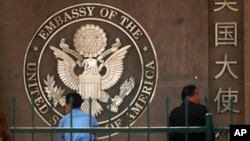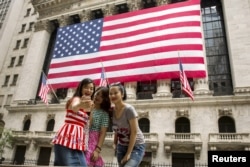The Chinese embassy in Washington has issued a warning to its citizens traveling to the United States as trade tensions intensify between the two countries.
Chinese tourists were warned of dangers such as costly medical bills, the possibility of gun violence and robberies, seizures by customs agents and natural disasters.
"Public security in the United States is not good," said an embassy statement published last week. "Cases of shootings, robberies, and theft are frequent."
The warning comes as tensions are escalating between the world's two largest economies over the threat of trade tariffs.
U.S. President Donald Trump is planning to impose tariffs on $34 billion in Chinese goods beginning Friday and China is vowing to respond with tit-for-tat tariffs the same day.
Trump has threatened to further escalate the trade conflict with tariffs on as much as $400 billion in Chinese products if Beijing retaliates on Friday.
When asked Tuesday if the timing of China's travel warning was politically motivated, China's Foreign Ministry spokesman, Lu Kang, said the embassy was obligated to issue the alert because the summer is the height of the travel season for Chinese tourists visiting the U.S.
"I think this is absolutely a matter that is in the scope of our duty," Lu said.
Gun violence an issue
China's warning comes as immigration checks on visitors entering the U.S. are increasing and gun violence is on the rise. China's official ruling Communist Party newspaper, The Global Times, lambasted the U.S. for its handling of gun violence in February after a mass shooting at Marjory Stoneman Douglas High School in Florida that killed 17 students and staff members.
The report urged the U.S. to "impose harsh restrictions on gun purchases" and said "The U.S. has no other choice but to adopt gun control."
China often issues warnings for Chinese travelers, usually in war-afflicted regions. But some foreign governments have accused China of using tactics such as curtailing outbound tourism to settle political or trade disputes, accusations that China typically denies.
The United Nations reported last year China has led the world since 2012 in the number of tourists who travel abroad. The U.N. said Chinese tourists spent $261 billion in foreign countries in 2016, more than double travelers from the U.S. spent.
More Chinese tourists are visiting the U.S., according to the U.S. Commerce Department. It said nearly 3 million visited the U.S. in 2016, a nearly six-fold increase since 2009. Chinese tourist visits to the U.S. rank fifth behind Canada, Mexico, Britain and Japan.
A 2017 survey of Chinese and other tourists by the marketing firm Nielson found that half of the Chinese respondents said the safety of a destination would impact their decision on where to travel.






